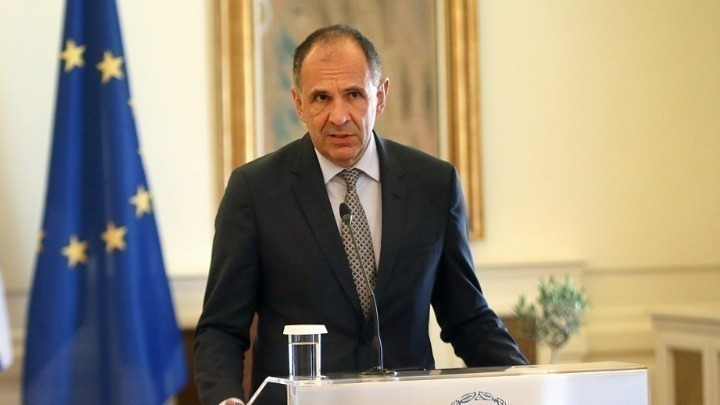Gerapetritis: Libya visit marred by 'organisational difficulties' in observing diplomatic protocols

The poor outcome of the European ministers' trip to Benghazi was the result of "organisational difficulties, which led to an inability to observe diplomatic protocols," Foreign Minister George Gerapetritis asserted in an interview with SKAI television on Wednesday.
Noting that the trip had been organised by the European Commission, not by Greece, Gerapetritis said that "in reality, there was an inability of the European Commissioner and his delegation to talk in the way that the European Commission's diplomatic protocol demands."
He rejected the criticism voiced by opposition parties, noting its "simplistic" understanding of geopolitical phenomena, while adding: "When there is a visit that is organised by the European Commission, which ended in the way it ended...and this is then blamed on Greece, we understand that there is either very deep ignorance of the phenomena or an excess of oppositional zeal that does not benefit the country."
Greece is obliged to talk to Libya given that the country is a close neighbour, he pointed out, stressing that Greece "has never abandoned Libya", which is always at the centre of Greek interest. "Greece must have a balanced stance toward Libya, a state that does not currently have a single unified authority," he added.
Gerapetritis also referred to his own meeting with the Libyan leader Khalifa Haftar and his sons on Sunday, pointing out that the Greek side constantly raises the fact that the Turkish-Libyan memorandum is null and void, and that he intends to visit the city of Tripoli next Tuesday for talks with the government of western Libya.
The exercise of Greece's sovereign rights 'neutralises' the Turkish-Libyan memorandum
Talking about the Turkish-Libyan memorandum, Gerapetritis said that its invalidity was intrinsic and that it remained null and void "regardless of who ratifies", adding: "This is because the problem with the Turkish-Libyan [memorandum] is not only whether it derives for a legitimised authority. It is a fact that, based on international law, Turkiye and Libya cannot agree such a delimitation because they do not have opposite coasts."
The minister pointed out that talks with Libya on delimiting maritime zones started in the 2010s but were never completed. He also noted that Greece had reached a full understanding with Egypt, which was Libya's immediate neighbour.
According to Gerapetritis, the Turkish-Libyan agreement "is neutralised in practice by the exercise of the country's sovereign rights" and noted that actively exercising these rights generates reactions.
With respect to migration and the large numbers arriving from Africa, the minister said that the situation in Africa was extremely volatile and that the problem for Greece were the heightened flows from eastern Libya, a problem shared with Italy and western Libya.
He said that Greece will take steps to restrict irregular migration and that Europe had already mobilised in this direction, stressing that if the current trend continued there will be a "much stricter framework".
According to Gerapetritis, the right policy at this time is a balance and functioning relations with both sides in Libya, while he underlined that Greece will not be allowed to become a "pool of irregular migration".
On relations with Turkiye, Gerapetritis stressed that the Athens Declaration continues to apply but emphasised that this has no impact on Greece's sovereign rights. He also made it clear that Greece would not waive these rights because of reactions, including the right to extend its territorial waters at such a time as it considers the most opportune.
He clarified that the Greece-Turkiye High-level Cooperation Council will go ahead and also emphasised the excellent relations between Greece and the United States.

















































































